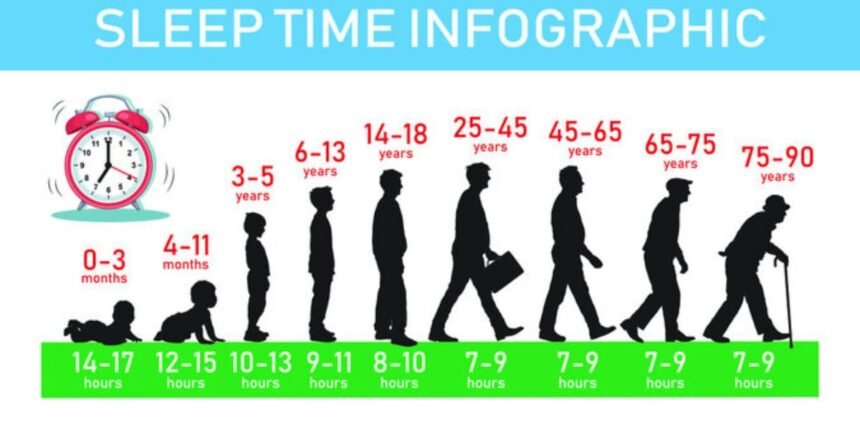How Much Sleep Do You Need by way of Age
Getting sufficient sleep is essential on your fitness. However, the quantity of sleep you need varies depending to your age, gender, interest level, and even your genes. Children and teens commonly require greater sleep than adults Sleep Needs Based On Age. Over two years, the National Sleep Foundation conducted substantial studies to decide the pointers for the way tons sleep is needed for unique age organizations:
Read More: Olympic Names for Babies
- Newborns (three months or younger): 16-18 hours
- Infants (4-eleven months): 12-16 hours
- Toddlers (1-2 years): 11-14 hours
- Preschoolers (3-five years): eleven-thirteen hours
- School-elderly kids (6-thirteen years): 9/11 hours
- Teenagers (14-17): 8-10 hours
- Adults (18 and older): 7-nine hours
Why is sleep critical?
Sleep has a more impact on you than you could understand. Your sleep nice has a direct impact on the way you experience all Sleep Needs Based On Age through the day, in addition to your physical and mental fitness. Here are a few reasons why getting a terrific night’s sleep is crucial:Regulates the production of melatonin Sleep Needs Based On Age, which in flip regulates your moods, productiveness, and ingesting conduct
- Improves the neurotransmitter concentration Sleep Needs Based On Ages for your brain and facilitates decorate your productivity, attention, recognition, and creativity
- Improves athletic overall performance by Sleep Needs Based On Age using increasing response time, quickness, and agility
- Regulates your weight through complex hormonal interactions that influence your satiety ranges and ingesting behavior
- Aids inside the recovery of ailments and strengthens your immune device
What takes place if you don’t get enough sleep?
If you do not get enough sleep frequently Sleep Needs Based On Age, you could expand sleep deprivation. If that is the case, your frame Sleep Needs Based On Age will most possibly ship alerts which you need extra sleep. Symptoms consist of:
- Sleepiness for the duration of the day
- Irritability
- Lack of motivation and productivity
- Difficulty focusing
- Difficulty with memory
- Difficulty making decisions
- More hunger than typical, causing weight advantage
- Dark circles below the eyes
- General stupid complexion
- Weakened immune machine
- Mood disorders (depression or tension)
Chronic sleep deprivation can purpose Sleep Needs Based On Age weight problems, diabetes, excessive blood strain, coronary artery disorder, stroke, or even intellectual illness. Adequate Sleep Needs Based On Age rest can help prevent these issues and is an essential part of living a wholesome lifestyle.
Here’s the Ideal Amount of Sleep by using Age for Kids and Adults
The average person desires 7 Sleep Needs Based On Age to nine hours of sleep, however that’s only a guideline. Here’s how to tell what number of hours you Sleep Needs Based On Age really want.
Quick data approximately how an awful lot sleep you need:
- For the common grownup, you go through about four to 6 sleep cycles a night. To undergo those cycles, you’ll need about 7 to nine hours of sleep.
- Sleep hints are primarily based on public fitness guidelines, because of this you may want more, or much less, to sense restored.
- Let your body sleep and wake without alarms for 10 to 14 days to discover how many hours you naturally need.
- Be careful of overestimating sleep. Awake time in mattress shouldn’t depend towards your overall hours.
- Infants and youngsters need their caregiver’s assist to set up a healthy sleep schedule. Kids will even gain from a 30-minute wind down habitual before bed.
We’ve all skilled the advantages Sleep Needs Based On Age of properly sleep before. You realize that feeling when you wake up in the morning feeling refreshed, comfortable, and restored? Now assume lower back Sleep Needs Based On Age to how tons sleep that turned into — was it six hours of sleep or seven or 8? There is not any single “right” answer as it varies from man or woman to individual. Age, environmental elements, each day sleep behavior, and person needs, from activity stage to typical fitness, can all impact what number of hours of sleep you want.
Keep studying for experts’ top hints Sleep Needs Based On Age that will help you reap an most appropriate quantity of exceptional sleep. Hint: Sleep Needs Based On Age It begins with now not obsessing over getting the encouraged “regular” wide variety of hours.
The common amount of sleep needed by using adults and children
Before we dive into hints, it’s proper to begin with a baseline. According to the National Sleep Foundation, adults among 25 and 64 years of age need a mean of 7 to nine hours of sleep per night. Adults 65 and older want 7 to 8 hours in keeping with night time. This is primarily based on public fitness guidelines, but internal and Sleep Needs Based On Age outside factors may trade the variety of hours you need. Kids mainly need the maximum sleep, to promote increase and improvement. The quantity of sleep wished Sleep Needs Based On Age varies, depending on their age, family schedules, and character temperament.
Optimal bedtimes for youngsters to get enough sleep
“Newborns don’t absolutely have properly-organized sleep with a true bedtime till the four- to 6-month mark,” says Lynelle Schneeberg, Psy.D ., a pediatric sleep psychologist and creator of “Become Your Child’s Sleep Coach.” “From the four-to-6-month mark until the primary birthday, most [experts] endorse a bedtime of 6 p.M. To 7 p.M. For infants, the bedtime ought to pass a piece later, 7 p.M. To 7:30 p.M.,” she notes.
Parents will need to thing in time for their child’s bedtime recurring, approximately 15 to 30 minutes for toddlers six months and up and babies “Newborns don’t absolutely have properly-organized sleep with a true bedtime till the four- to 6-month mark,” says Lynelle Schneeberg, Psy.D ., a pediatric sleep psychologist Sleep Needs Based On Age and creator of “Become Your Child’s Sleep Coach.” “From the four-to-6-month mark until the primary birthday, most [experts] endorse a bedtime of 6 p.M. To 7 p.M. For infants, the bedtime ought to pass a piece later, 7 p.M. To 7:30 p.M.,” she notes.
, relying on whether it’s far a tub night, Schneeberg says. Even if the child has historically taken longer to settle, Schneeberg recommends Sleep Needs Based On Age capping the habitual at half-hour. “If the workouts are too Sleep Needs Based On Age long or complicated, youngsters are more likely to stall and try to add matters to the ordinary.”
How sleep amount aids with sleep first-class
Dr. Abhinav Singh, the medical director of the Indiana Sleep Center and medical assistant professor at Marian University, explains that two types of sleep take vicinity at some stage in the night, and also you need to revel in both for top-rated rest. “Adults generally go through 4 to 6 sleep cycles a night time,” explains Singh. “This provides as much as roughly approximately 7 to 9 hours of sleep to deal with the variety.”
The styles of sleep are:
- non-speedy eye movement sleep (NREM): NREM sleep includes sleep tiers 1 to 3, that is governed via homeostasis. Stages 1 and 2 are “light” tiers because it’s less complicated to awaken for the duration of Sleep Needs Based On Agethese ranges. Most of your night could be in stage 2. Stage 3, additionally referred to as deep or sluggish wave sleep, is whilst the body looks after house responsibilities, which include muscle restore, growth hormone launch, mind toxin cleansing, and a few sorts of memory functions.
- rapid eye movement (REM) sleep: REM sleep, also referred to as dream sleep, is ruled by using your circadian rhythms. This is the time your mind makes use of to type via memories, emotions, and trendy comprehension.
While positive degrees are taken into consideration Sleep Needs Based On Age lighter or deeper, you may still be woken up from every.
How to prioritize fine over amount
Have you ever gotten eight or nine hours of sleep and woken up feeling unrefreshed? When this happens, it suggests that the nice of sleep was insufficient, says Singh. He says that a variety of intrinsic elements may be disrupting sleep, along with a companion’s loud night breathing, stressed limbs, insomnia, or drowsing in an surroundings Sleep Needs Based On Age that’s too warm or too cold, has an excessive amount of mild, or is prone to noise.
1. Figure out your natural sleep range
Instead of stressing approximately getting 8 hours of sleep, let your frame drive your sleep number. Singh cites an approach evolved by hi s colleague Dr. Charles Joonghie Bae, an companion professor of medical medication at the University of Pennsylvania.
“Let your frame naturally doze off and wake up and notice wherein the wide variety lands. At the cease of 10 to fourteen days of alarm-free sleep Sleep Needs Based On Age, you’ll realize your herbal sleep wishes,” he says.
Some approaches to track and find out your sleep number consist of the usage of sleep diary. Or for an automated method, attempt a fitness or app sleep tracker. Be wary of sleep debt, which could have an effect on how an awful lot sleep you want at the beginning.
2. Follow your herbal circadian rhythm
Rather than defining sleep as bedtime, recall when you start to experience worn-out or relaxed — and what time the lights are out (literally and figuratively). Figuratively, it’s while the solar units as less mild publicity triggers your sleep–wake cycle so your frame will produce melatonin, a sleep-promoting hormone.“As the light fades, your sleep pressure has a tendency to rise,” says Singh. “As the light brightens, your sleep power is repressed, and your wake drives are extended.”
Literally talking, turning off gadgets to keep away from blue lighting or switching bulbs to emit warm tones will even support your herbal sleep-wake cycle. Adjusting your sleep schedule to your herbal sleep-wake cycle will help you transition from falling asleep to being asleep much simpler.
three. Choose your bedtime, primarily based to your cycle
Now you understand what number of hours your frame loves to sleep and around what time you begin getting tired and want to relax. Take those numbers, determine what time you want to awaken, and paintings backwards from there. Singh says that a great bedtime variety for adults is among eight p.M. And midnight, though he recognizes that people should do not forget their social and paintings obligations and intrinsic alternatives, consisting of being a night owl as opposed to a morning character.
Let’s say that you need to wake up by means of 6 a.M. And which you need eight hours of sleep. Your bedtime, this is, the time you need to go to sleep by way of, would be 10 p.M. However, it’s not likely which you’ll fall asleep proper away, so that you aspect within the 20 to half-hour it takes to settle in bed, which means that: If you need 8 hours of sleep and need to be up by 6 a.M., you want to be in mattress via nine:30 p.M.
4. Don’t forget about wind down time
Kids aren’t the handiest ones who benefit from a bedtime routine. Singh advises that adults provide themselves 30 minutes to wind down before sleep. He shows what he’s dubbed the 4-Play Method: shower, journal, examine, and breathe. “That will become the habitual so like a Pavlovian canine, it teaches the brain that this spells sleep,” Singh says.
- Shower or bath: This helps rev up your body temperature; as the skin dilates and loses heat, melatonin rises.
- Journal: Jot down your to-do list or thoughts, then placed it away.
- Read: Spend 10 to fifteen mins being attentive to or studying an editorial or e book.
- Breathe: Do a touch bit of relaxed respiratory with yoga or pay attention to a meditation.
If your bedtime was 9:30 p.M., after adding some other 30 minutes for a wind-down ordinary, this means you’d want to start the procedure of having to sleep by using nine p.M.
Of direction, if you work from home or don’t produce other morning commitments including getting kids prepared for faculty, you will be capable of shift your bedtime habitual later. If you’re a morning person, Singh’s tip is to attempt to sleep before nighttime. Sleeping earlier than middle of the night, for most morning human beings, lets in for ok amounts of each non-REM and REM sleep of their natural circadian rhythm.
Read More: Sleep Needs Based On Age
Be cautious of overestimating how much sleep you’re getting
If you generally tend to toss and turn before sleep, take into account of ways tons time it takes to sleep whilst you’re clearly in mattress. Overestimating sleep could lead to a persistent lack of sleep, which has been related to fitness troubles together with coronary heart ailment, Type 2 diabetes, obesity, and melancholy.
“[Many] think they’re getting forty five minutes to an hour extra of sleep [than they actually are],” Singh says. “It takes 20 minutes after your eyes close to get into restful, restorative sleep.” That time should take even longer, but, if you do different sports in bed like reading or scrolling on your telephone.If you’re no longer a snooze diary character and prefer your monitoring automatic, the usage of a sleep tracker will let you determine out what time you’ve been going to bed. “[Sleep trackers] may be barely higher at estimating quantity as opposed to excellent,” Singh says. But at the cease of the day — or in the morning — agree with your frame to inform you the way you sense approximately your sleep last night.






